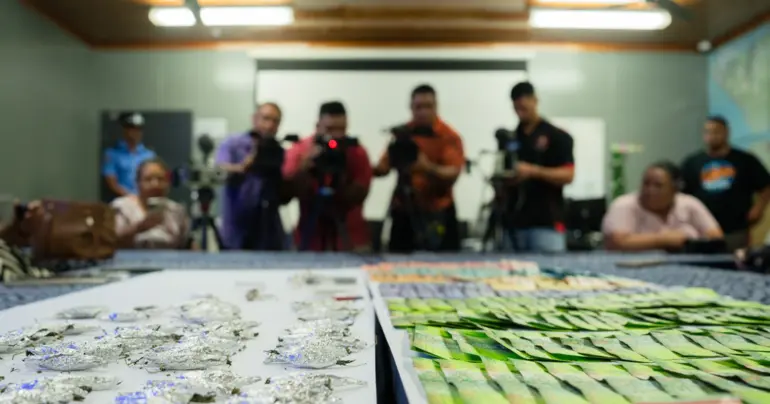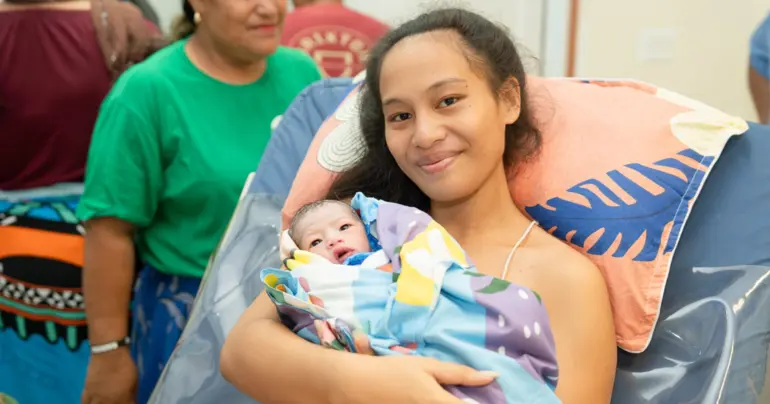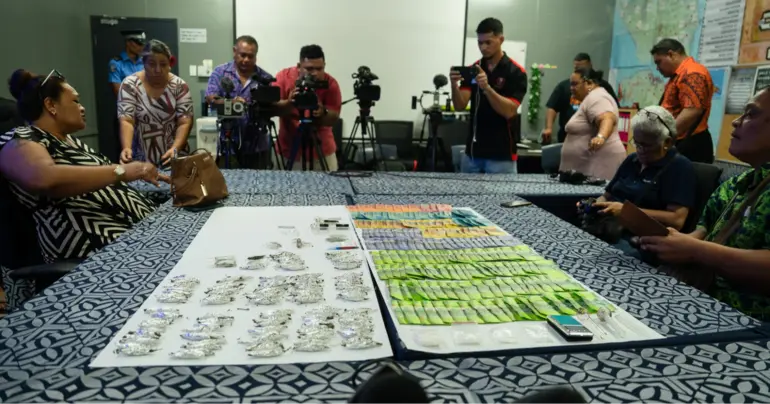Panel confronts Samoa's political gender gap
Obstacles to Samoan women's participation in politics and representation in leadership roles were the focus of a discussion held by a six-woman panel at the National University of Samoa (N.U.S.) on Monday.
Among other topics, the International Women's Day roundtable discussed barriers to women's political participation, gender perceptions, and challenges facing women in politics.
The panel was composed of six women, including former Members of Parliament – Fiame Naomi Mata’afa who is running unopposed under the Faatuatua i le Atua Samoa ua Tasi (F.A.S.T.) banner in her constituency of Lotofaga and candidate for Alataua West Aliimalemanu Alofa Tuuau who is running for re-election with the Human Rights Protection Party (H.R.P.P.).
"I believe there are different barriers... the opportunity to sit in village fonos (meetings), is where it should all start. Participating in village council meetings and being heard, because that's where your election comes from - your village, your constitution," said Aliimalemanu.
"It's difficult for women to get into those meetings."
Also included were Former Attorney-General Taulapapa Brenda Heather-Latu, Muliagatele Dr. Potoae Roberts Aiafi (a consultant), U.N. Resident Coordinator Dr. Simona Marinescu and Mulitalo Mauga Fetogi R. Vaai, the Assistant Chief Executive Officer (A.C.E.O.) for Legal Policy and Investigation Office of the Electoral Commission.
Taulapapa Brenda, who served as Attorney-General from 1997 to 2006, said one of the fundamental barriers was whether women were willing to enter the prevailing environment in Parliament.
"I think it's hostile, aggressive and an abusive place at the moment, and it has been for a long time.
"I thought about the idea of going into Parliament, until I watched and heard women M.P.s, especially Tuala Tiresa Malietoa, attempting to raise issues about education which... she had a particular experience and knowledge of and to be roundly abused about her personal life and about the fact that she didn't know anything.
"That for me, illustrated one of the greatest barriers for women to go in to the House."
Taulapapa went on to say that such an environment would only change if more women were in Parliament. She said it was a question of how the way can be eased for more women to step into "an angry house".
It was her view that women are needed to change an environment that she says is "crude, rude and graceless".
Samoa's U.N. Resident Coordinator, Dr. Marinescu said that there were very few countries that still have legal barriers preventing women from exercising their rights.
"We start by ensuring women have access to education. They are encouraged to purse their aspirations and they have a workplace where there is respect and all forms of safety.
"Having access to training opportunities to develop their careers. That's how we remove barriers everywhere."
Mulitalo Fetogi of the Office of the Electoral Commissioner said now women's parliamentary representation was constitutionally guaranteed with the 10 per cent quota.
She also pointed out that there was an amendment to the Electoral Act that says a women's representative (sui tamaitai) can confirm a candidate's monotaga (service) prior to nomination for election, illustrating the Electoral Commission's acknowledgement of women and their roles in the village.
Muliagatele Dr. Potoae said only 5 per cent of women participate in village council meetings.
"Do we need to change the system? Make some interventions so we have more women in the meetings?"
She said another barrier is a social attitude, especially women against women, adding that the subtleties of discrimination even within one's own family, can be difficult to overcome.
Former Deputy Prime Minister Fiame said women across the world have been facing the same discriminatory attitudes for some time and the question of barriers should be directed inward.
"Is our parliament a representation of our society as we are today?" asked Fiame.
She went on to say that women have a lot to think about in terms of how they identify themselves, as they often group themselves based on their particular focus and activity, but not on their status and how they see themselves in Samoan society.
"What do we want to do as women? Do we have equal rights? That conversation doesn't really happen," said Fiame.
The Samoa Roundtable is one of three (others will be held in Malaysia and Morocco) as part of a multi-country project funded by the British Academy to explore women in political participation, the systems that support or impede participation and the role of the state and local Government in shaping women’s roles not only in the sphere of politics but also in society.
Author and Historian at N.U.S., Meleisea Leasiolagi Dr. Malama Meleisea served as moderator.
Britain's High Commissioner to Samoa, David Ward, noted that the gulf between women and men's participation at the top of public life was a global problem. It will take an estimated 130 years before the world sees men and women serving equally as heads of states and Governments if current trends continue, he said.
Almost all 200 countries of the world are “committed to promoting parity of participation of women and men in politics and decision making,” Mr. Ward told the panel.
Of the 200 nations in the world, 119 have never had an elected woman leader and only 13 countries have an elected woman head of Government, he said.
Currently, 22 countries of the world have had an elected woman head of Government according to U.N. Women statistics, he noted, also declaring that obstacles limiting women and girls from participating in politics must be removed
Only 21 percent of Government ministers around the world are women, and only 14 countries have women currently occupying 50 percent or more of ministerial positions.
Twenty-five percent of all national parliamentarians in the world are women. Although the percentage rose, up from 11 percent in 1995, there are three times more men than women elected to serve in parliaments.
“Only four countries have 50 percent or more women parliamentarians in their lower houses: Cuba, Rwanda, Bolivia and the United Arab Emirates,” said Mr. Ward.
“Twenty-seven states have fewer than 10 percent women parliamentarians…there are only four countries with no women parliamentarians at all. Three of those are among the Pacific Island states, where women across the region represent only six percent of parliamentarians.”
According to the most recent rankings by the Inter-Parliamentary Union (I.P.U.), a global organisation of national parliaments, the three Pacific states with no women parliamentarians are the Federated States of Micronesia, Papua New Guinea and Vanuatu.
As of January 2021, the top five nations are Rwanda 61.3 per cent, Cuba 53.2 per cent, United Arab Emirates 50 per cent, New Zealand 48.3 per cent and Mexico 48.2 per cent. The I.P.U. ranks the United Kingdom 40th with a little over one third women representation in parliament.
Among the barriers that prevent women from advancing in politics are discriminatory laws that leave women marginalized from the political sphere, said Mr. Ward.
“Looking back to those statistics I began with, at the current rate of progress, it will take until 2063 for women to achieve equal representation in national parliaments; until 2077 in positions as Government minsters and it will take until 2151 for the world to reach gender parity in the highest leadership positions as elected heads of states of Government,” said Mr. Ward.
Several panel members said political awareness is much better than it has been in the last two decades.
Dr. Marinescu said in Samoa, 75 percent of non-government organisations (N.G.O.s) are headed by women, a clear indication that women are taking on leadership roles in many areas.
The U.N., she added, has taken a strong stance in advocating for voters to elect women.
“We have strong candidates and we said please vote for women in this country. Our advocacy has been very strong,” said Dr. Marinescu.
“Candidates this year are very strong and we are quite sure we will see them in the next Parliament.”
Former Attorney-General Taulapapa, who has been outspoken in opposition to the controversial Lands and Titles Court (L.T.C.) Bills said she has seen greater public engagement in the last eight months “than I have seen in the last 25 years” living in Samoa.
In the last six months, there has been a noticeable political rise with many “ordinary people” choosing to run for office, she added.
Five women representatives were members of the recently dissolved XVI Parliament (2016-2021) - Aliimalemanu Alofa Tuuau, Faaulusau Rosa Duffy-Stowers, Faimalotoa Kika Iemaima Stowers, Fiame Naomi Mataafa and Gatoloaifaana Amataga Alesana-Gidlow.











